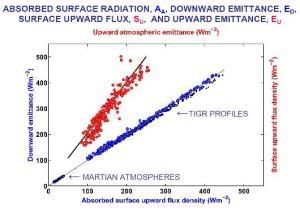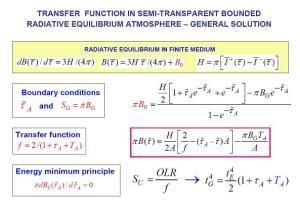New derivation of equations governing the greenhouse effect reveals "runaway warming" impossible That was until he learned the details of a new theory of the greenhouse effect, one that not only gave far more accurate climate predictions here on Earth, but Mars too. The theory was developed by another Hungarian scientist, Ferenc Miskolczi, an atmospheric physicist with 30 years of experience and a former researcher with NASA's Langley Research Center. After studying it, Zágoni stopped calling global warming a crisis, and has instead focused on presenting the new theory to other climatologists. The data fit extremely well. "I fell in love," he stated at the International Climate Change Conference this week. "Runaway greenhouse theories contradict energy balance equations," Miskolczi states. Just as the theory of relativity sets an upper limit on velocity, his theory sets an upper limit on the greenhouse effect, a limit which prevents it from warming the Earth more than a certain amount. How did modern researchers make such a mistake? They relied upon equations derived over 80 years ago, equations which left off one term from the final solution. Miskolczi's story reads like a book. Looking at a series of differential equations for the greenhouse effect, he noticed the solution -- originally done in 1922 by Arthur Milne, but still used by climate researchers today -- ignored boundary conditions by assuming an "infinitely thick" atmosphere. Similar assumptions are common when solving differential equations; they simplify the calculations and often result in a result that still very closely matches reality. But not always. So Miskolczi re-derived the solution, this time using the proper boundary conditions for an atmosphere that is not infinite. His result included a new term, which acts as a negative feedback to counter the positive forcing. At low levels, the new term means a small difference ... but as greenhouse gases rise, the negative feedback predominates, forcing values back down. NASA refused to release the results. Miskolczi believes their motivation is simple. "Money", he tells DailyTech. Research that contradicts the view of an impending crisis jeopardizes funding, not only for his own atmosphere-monitoring project, but all climate-change research. Currently, funding for climate research tops $5 billion per year. The equations also answer thorny problems raised by current theory, which doesn't explain why "runaway" greenhouse warming hasn't happened in the Earth's past. The new theory predicts that greenhouse gas increases should result in small, but very rapid temperature spikes, followed by much longer, slower periods of cooling -- exactly what the paleoclimatic record demonstrates. However, not everyone is convinced. Dr. Stephen Garner, with the NOAA's Geophysical Fluid Dynamics Laboratory (GFDL), says such negative feedback effects are "not very plausible". Reto Ruedy of NASA's Goddard Institute for Space Studies says greenhouse theory is "200 year old science" and doubts the possibility of dramatic changes to the basic theory.
Miklós Zágoni isn't just a physicist and environmental researcher. He is also a global warming activist and Hungary's most outspoken supporter of the Kyoto Protocol. Or was.

Miskolczi resigned in protest, stating in his resignation letter, "Unfortunately my working relationship with my NASA supervisors eroded to a level that I am not able to tolerate. My idea of the freedom of science cannot coexist with the recent NASA practice of handling new climate change related scientific results."
His theory was eventually published in a peer-reviewed scientific journal in his home country of Hungary.
The conclusions are supported by research published in the Journal of Geophysical Research last year from Steven Schwartz of Brookhaven National Labs, who gave statistical evidence that the Earth's response to carbon dioxide was grossly overstated. It also helps to explain why current global climate models continually predict more warming than actually measured.
Miskowlczi has used his theory to model not only Earth, but the Martian atmosphere as well, showing what he claims is an extremely good fit with observational results. For now, the data for Venus is too limited for similar analysis, but Miskolczi hopes it will one day be possible.
Monday, 31 March 2008
Global Warming?? Wrong!
Subscribe to:
Post Comments (Atom)






.jpg)








No comments:
Post a Comment